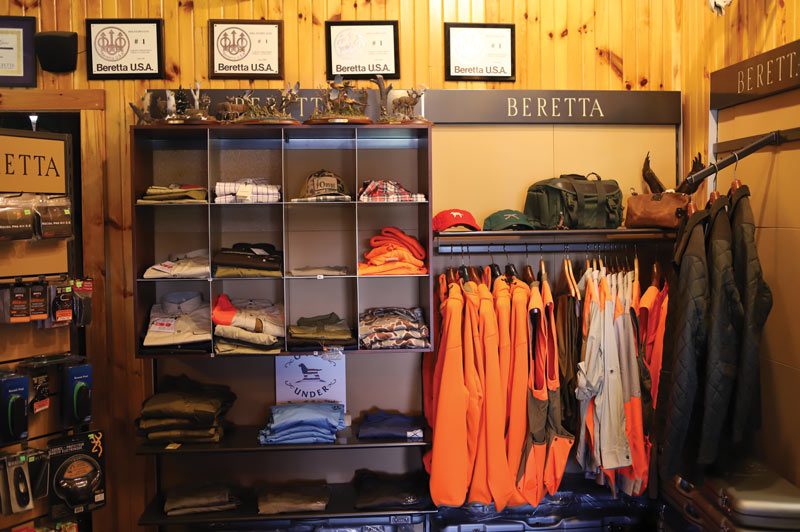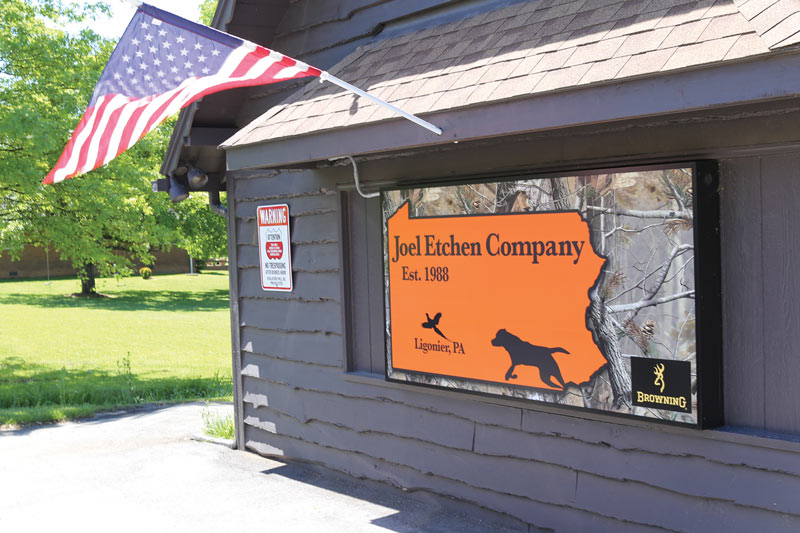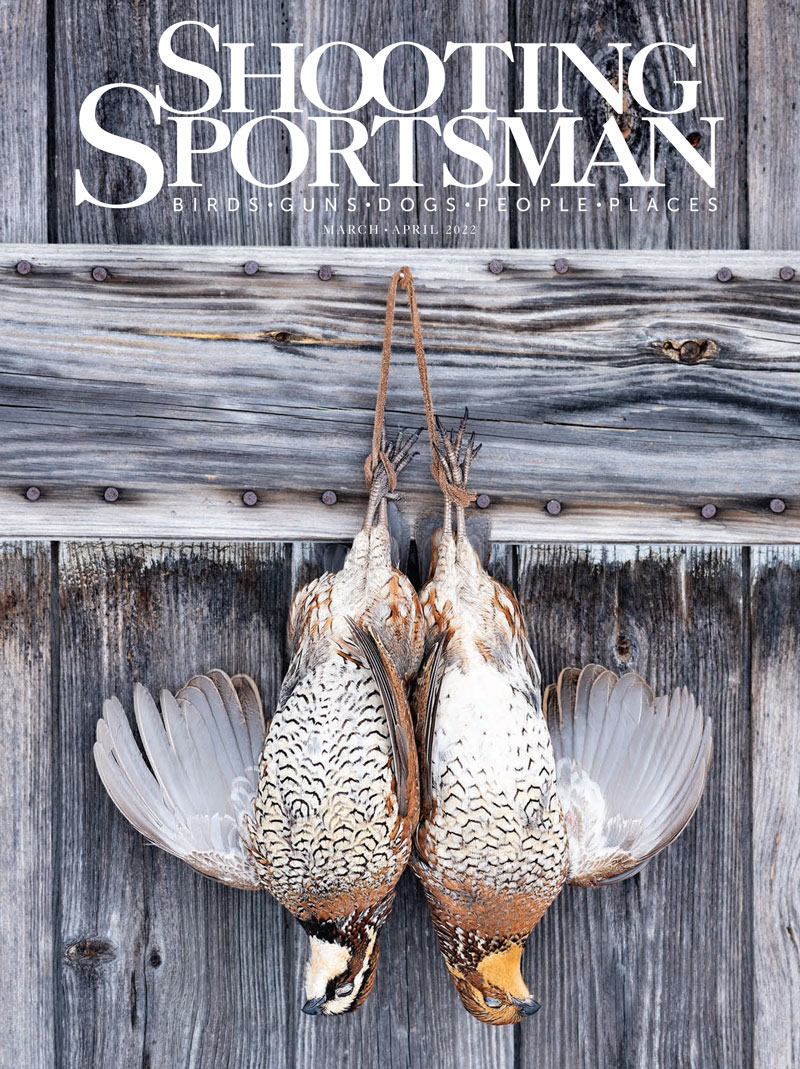The story of Joel Etchen Guns
Text & photos by Tom Sternal
I remember when I discovered Joel Etchen Guns. It was 1996 and still the early days of Internet shopping. Back then my 56-Kbps dial-up Global Village modem and America Online installed from a direct-mail CD qualified as high speed. Until then, searching for the right gun—or at least the one I was looking for—had required hoofing it from gun store to gun store or looking at listings in magazines. But for a twentysomething living in New York City, online gun listings were a revelation.
That year I was in the midst of an emerging sporting clays obsession, and my closest outlet was the Sandanona Shooting Grounds, in Millbrook, New York. Still new to the sport and wanting to upgrade from my field-grade Remington 11-87, I noticed a shooter at the wobble trap was shouldering a Beretta 682 Greystone with longish barrels. A little small talk later, and he let me shoot the gun. I remember being amazed by the palm swell, the fit, the fluid movement of a dedicated clays gun. I went home determined to buy my first over/under—and it simply had to be a Beretta 682 Greystone with 30-inch barrels, a right palm swell and the perfect fit.

Enter Joel Etchen Guns. Or, more correctly, enter “Beretta shotgun” into the foremost search engine of the time—Yahoo—and back came Joel Etchen Guns. Even then, with crude search algorithms, Etchen’s, in Ligonier, Pennsylvania, was the place to go. I knew nothing of Joel or his burgeoning business just a couple of miles from the famed Rolling Rock Club, about 20 minutes southeast of Latrobe, but this much became clear: If you wanted a Beretta from someone who knew the sport and its instruments, Joel was the guy to go to.
Joel patiently answered my questions and put to rest any anxiety I had about making what was then the largest purchase I’d ever made sight unseen. About 10 days later I made my way to John Jovino Gun Shop, in lower Manhattan’s Little Italy, to complete the transfer. I hopped a cab and returned to my one-bedroom apartment. The gun came up perfectly, and the rest is history.
Fast-forward 25 years, and on a road trip to Wisconsin in late May, I took a detour to visit Joel Etchen and his daughter, Rebecca, and to see the operation that served as the baptismal font for my love affair with double guns. On a bright and pleasant day I sat with father and daughter in the homey showroom of the quintessential late-20th Century/early-21st Century family gun business. It is a store, a business and a tradition five generations in the making—sadly, a type that exists less and less. These days, with big-box stores and wholesale global distribution, buying a new gun can be a rather sterile and generic transaction. But buying a gun from Joel Etchen brings with it multiple lifetimes of experience.

“From the start,” Joel recalled, “this business has been about helping people—helping them get the right shotgun for the right purpose. And to keep our focus on what we know and do best—and that’s shotguns for trap, skeet, sporting clays and hunting. We’ve never veered from that focus.”
If I’d come to Ligonier for wild stories, bravado or outsize personalities, I’d have come to the wrong place. Both father and daughter are practical, humble and honest people. They don’t promote and sell products; they educate and serve their clients based on countless hours, days, months and years on the trap field and clays course and in the uplands. They are experts borne of experience and offer their knowledge modestly and without a hint of ego.

The unassuming, brown-sided, single-story gun store holds a surprising amount of American shotgunning history. Back in the day, Joel’s great-grandfather, John, a market hunter operating in Kansas, had six sons. One of them, Fred, was the captain of the first American trapshooting team to win Olympic gold—at the 1924 Paris Games. Fred’s only child, Rudy (Joel’s father), was a competitive shooter by the time he was 13, and he is the only man to have won every category at the Clay Target at the Grand American. At one time Rudy broke a remarkable 1,026 consecutive tournament clays. Joel is no slouch, either, with championships and awards too numerous to mention. Yet one in particular deserves attention. When Joel won the Class Championship at the Grand American in 1992, there were 2,500 entrants. In all 69 shooters recorded perfect scores of 200 x 200. The resulting shoot-off took nearly five hours, and Joel recorded 125 straight hits to claim the title.
In 1988 this lineage and his love of shooting clays led Joel to start moonlighting selling Ljutic trap guns. Trap was still king, with thousands of competitors showing up at big shoots, including the Grand American, in Vandalia, Ohio. At the same time sporting clays had begun catching on, offering shooters around the world a challenge that fueled obsessions like mine—with a whole new category of guns and gear to be sold.
By 1994, Etchen and his family were convinced that Joel could leave his automotive-sales business and make Joel Etchen Guns a full-time vocation. This led to what soon would develop into a deep and beneficial relationship with Beretta. In time and in terms of guns sold, Joel Etchen would become Beretta’s largest independent target-gun dealer in the US. All of this out of a humble, meticulously kept, roadside gun store along Route 30 in western Pennsylvania. Yes, there were many in-person visits from gun lovers and buyers from across the country—including a cadre of Super Bowl-winning Pittsburgh Steelers—but relationships were built over folding tables under unpredictable weather at shooting events and long-distance phone calls from eager buyers near and far. And, of course, there was the Internet.

Before I bought my first over/under from Etchen, I spent hours looking at his then-rudimentary site, which was filled with mostly new inventory and gun and gear closeouts. Today, Etchen sells not only Beretta shotguns but also guns from Ljutic, Browning, Krieghoff, Kolar, Perazzi, Benelli, Caesar Guerini and Fabarm. Yet perhaps the most identifiable offerings are the Joel Etchen line of signature Berettas. “It was ’95,” Joel said, “and I wanted to start a series of unique guns. I approached the Beretta family, and they allowed me to do that first with a handshake agreement on a set number of guns. I worked with them, and they helped me expand the line and added higher-grade wood and my logo. At the end of the day, it’s something unique that really separates my store from other stores. We have some two-barrel sets, like 28 gauge and .410, that no one else has. My relationship with Ugo and his sons Franco and Pietro Beretta as well as Carlo Ferlito, Beretta’s general manager and chief operating officer, are extremely important to me.”
These guns combined with a gunsmithing shop and a collection of neatly displayed shooting gear and clothing from Barbour, Orvis, Dubarry, Filson, Beretta and other brands that is managed by daughter Rebecca are the family industry.
The latter fact—Rebecca’s role in managing the clothing operation—deserves some attention. A competitive shooter herself, Rebecca had only recently graduated from Penn State University when she was hired by Beretta and spent seven years learning the business from the corporate side while based in Accokeek, Maryland. While working for Beretta full-time, Rebecca somehow found the time to earn her MBA from Georgetown University. In 2007 Eddie Bauer, the legendary Seattle-based outfitter, came calling. The company wanted to add authenticity back into its business, and it did so by starting a hunting division called The Sport Shop. Informed by Rebecca’s vast shooting experience combined with the expertise of noted hunter and guide John Burrell, owner of High Adventure Company, Eddie Bauer launched a small, curated collection of men’s and women’s brush pants, chaps, hunting shirts, jackets, vests and bags at the 2012 SHOT Show. The products were a convergence of performance and style, and they brought the company the bona fides it had been looking for. And here is another personal shopping confession: I bought several Sport Shop products—brush pants, a clays vest, down jackets—and they are among the best I have ever owned.
According to Rebecca, “In 2013, after launching The Sport Shop, my husband and I came back to Ligonier. It was a great experience at Beretta and then Eddie Bauer, but this was home for both my husband and me. I’d worked part-time at the store growing up, but the idea was that I was now to learn everything and anything. That’s the way we all work here. Everyone can pitch in and do what needs to be done.”
At that point Joel jumped in. “And that’s why she’s here,” he said. “When I decide to move on, Rebecca will be ready to take over. But, for now, I’m still the micromanager.”
Like many jokes, there was an element of truth embedded in Joel’s quip, and Rebecca let out a polite—and daughterly—laugh. And this is where the story is destined to continue: a family business borne of expertise, fueled by pragmatism, sustained by loyalty and integrity, and ready to be passed from one generation to the next—without missing a beat.
For more information on Joel Etchen Guns, visit joeletchenguns.com.
Buy This Issue!
Read our Newsletter
Stay connected to the best of wingshooting & fine guns with additional free content, special offers and promotions.







